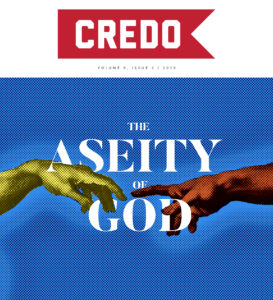If God is omniperfect—the greatest imaginable being—then he will exist a se, i.e., with absolute self-sufficiency. Nothing other than God will explain his existence and nature, and he will have no needs. Therefore, God will be all-powerful, all-knowing, and maximally good, since any shortfall in these attributes would compromise his aseity. This last conclusion follows from what aseity entails, should any being possess it. Consider the following argument which begins with some useful definitions.
God’s Aseity Demonstrates His Necessity
If something exists contingently, then it might not have existed; and in that case, its existence will be explained by something else. For example, then, the Eiffel Tower is a contingent thing, because it might not have existed; and in that case, something else explains why it does exist. However, if something exists necessarily, it cannot fail to exist. Accordingly, if God is a logically necessary being, the utterance, ‘There is no God,’ will imply nonsense, since God’s nature would guarantee his existence.
Now suppose that we describe God (wrongly) as all-powerful, all-knowing, but only very good. In that case, God’s degree of goodness will be a contingent fact about him. That is, he instantiates this or that level of goodness, and he might have instantiated a different one. But if so, his present state of goodness will require some explanation, since it could have been otherwise; and in that case, God could not exist a se. An outside factor will explain his present (but mutable) state of being. Therefore, if God exists a se, he will be maximally perfect, not just far better than we are. The same argument would require God to be all-knowing and all-powerful. A God who exists a se cannot be simply stronger and better informed, compared to us or the angels. He must possess his great-making attributes to the maximal degree.
These arguments show that some of what the Bible says about God must be said about God. He will have created everything out of nothing if he creates at all, because nothing could have existed prior to God or alongside God—not, that is, if he exists a se. If something else had existed before God, that something would explain God and thus be God. Only the ultimate explainer would exist a se and thus qualify as God. Likewise, if per impossible something co-exists with God, on his level, its co-existence with God will be explained by an outside factor; and this factor would replace God as God.
An a se God is Trinitarian
God’s aseity implies his freedom in having created us and saved us from sin since he cannot have needed to do either one of these things. God’s aseity implies his freedom in having created us and saved us from sin since he cannot have needed to do either one of these things. Share on X The same attribute might also rule out his existence in the unitarian sense, such that there is no binity, trinity, or any other state of being, as per the Muslim account of ‘Allah.’ Suppose that relationships somehow complete persons, making them more than they otherwise would be. Wives complete husbands, and conversely. Friendships ‘realize’ parts of our nature which might otherwise be dormant. In that case, perhaps, a unitarian God could not exist a se, as he would lack the benefit of trinitarian relationship. Indeed, in this scenario, God’s creative acts would (plausibly) be acts of self-realization. He would need something from us after all, in which case this ‘God’ is not the God.
As a side-benefit, God’s aseity makes his existence demonstrable, once we grant that the universe exists. We know, for example, that the universe exists contingently, not with logical necessity. Nothing about the universe would entail its existence; and if so, the universe will be explained by something other than itself, something which exists independently or a se. We need an unheld upholder, or a self-explanatory explainer, lest we face an infinite regress of contingent causes or explainers, the whole set of them hanging in mid-logical-air. This explainer will also be personal, not an impersonal force, since the cause of all other things must self-actuate, rather than being actuated by something else. Therefore, it appears that God must exist and do so a se, as a logically necessary being.
The Relationship Between God’s Aseity and Human Reason
God’s aseity also provides a basis for reason as such, not just for thinking about him. Consider two accounts of logic and value, especially the norms that they imply. Either these norms are invented by us or presented to us. If they are invented, we may invent other ones; and their replacements might include conventions like, ‘When necessary for academic progress, one may cheat,’ or perhaps, ‘The suffering of left-handed people shall be maximized.’ But these results are mostly unattractive. Therefore, we should go the other way. Perhaps, the laws of logic and value are presented to us either as (a) mind-independent, abstract objects that we somehow perceive or as (b) ideas sent from God and commanded by him.
As for (a) above, we have the problem of explaining how a rule like, If a statement is true, then it is not false, can exist in the specified way, i.e., regardless of whether any minds exist. The second theory, (b) above, seems plausible enough. If laws of logic exist at all, they will exist in at least one mind. But not any sort of mind will do here. The laws of logic and value express necessary truths, not contingent ones. In other words, it is not possible for a principle like, If two statements contradict one another, they cannot both be true, to hold for some instances while failing in others. Likewise for ethical norms. If the proposition, Murder is evil, is true at all, it is necessarily true; and if false, then necessarily false. It cannot be true at some times and false at others. Therefore, in order to exist as ideas expressing necessary truths, the laws of logic and value will have to characterize the mental life of someone who exists a se and necessarily. Therefore, if certain laws of logic and value exist, God exists.
Though not the stuff of devotional literature, these arguments highlight the extent of our dependence on God and, very frankly, the stupidity of human sin, beginning from Eden. We want to push God away and stand beside him as colleagues, each of us calling our own shots and answerable to none. We would be captains of our own destinies, rendering back to God slices of our lives as time, chance, and desire permit. But now the joke lands even harder on us, in light of God’s aseity and what this attribute implies. Apparently, we depend on God in every possible way, not just as physical life requires. We cannot hold the simplest thought together without God. We cannot value rightly without God. We cannot see anything as really beautiful apart from his light shining into our hearts and minds. Break free? Of God? Let us rather rejoice in our captivity and wonder with the psalmist, “How precious to (us) are your thoughts, O God! How vast is the sum of them!” (Ps 139:17).



